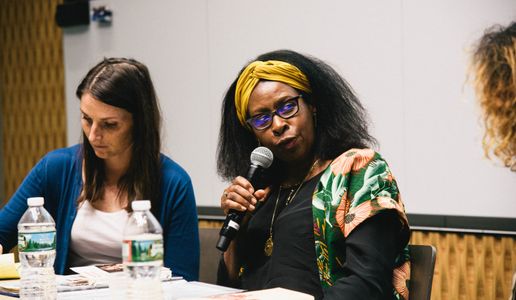CSE, ASC, CURA Host Talk With Scholastique Mukasonga
Rwandan author Scholastique Mukasonga gave a September 23, 2019 reading and talk hosted by the Center for the Study of Europe (CSE), the African Studies Center, and the Institute on Culture, Religion, and World Affairs (CURA)— affiliated regional and thematic center of the Frederick S. Pardee School of Global Studies. The talk was also co-sponsored by the BU Department of Romance Studies.
Born in Rwanda in 1956, Scholastique Mukasonga experienced from childhood the violence and humiliation of the ethnic conflicts that shook her country. In 1960, her family was displaced to the polluted and under-developed Bugesera district of Rwanda. The conversation was moderated by Odile Cazenave.
Mukasonga was later forced to leave the school of social work in Butare and flee to Burundi. She settled in France in 1992, only two years before the brutal genocide of the Tutsi swept through Rwanda. In the aftermath, Mukasonga learned that 27 of her family members had been massacred. Twelve years later, Gallimard published her autobiographical account Inyenzi ou les Cafards, which marked Mukasonga’s entry into literature. This event celebrates this year’s publication of The Barefoot Woman, translated from French by Jordan Stump, by Archipelago Books.
The Barefoot Woman is Scholastique Mukasonga’s loving, funny, devastating tribute to her mother Stefania, a tireless protector of her children, a keeper of Rwandan tradition even in the cruelest and bleakest of exiles, a sage, a wit, and in the end a victim, like almost the entire family, of the Rwandan genocide. But it’s also a wry, sharp-eyed portrait of the world her mother lived in, from its humblest commonplaces to its deepest horrors.
The mission of the Center for the Study of Europe is to promote understanding of Europe through its cultural heritage; its political, economic, and religious histories; its art, literature, music, and philosophy; as well as through its recent emergence as a new kind of international form through the European Union (EU). Operationally, the center provides a focal point and institutional support for the study of Europe across Boston University through coordination of teaching missions, support of research, community-building among faculty and students, and outreach beyond the University.
Boston University’s Institute on Culture, Religion, and World Affairs (CURA) brings together a multi-disciplinary community of scholars to encourage and support research on the role of religion in public affairs. Established in 1985, CURA is the oldest center for the study of religion and world affairs in the United States. Supported by a substantial endowment and grants from funders such as the Henry Luce Foundation, the Templeton Foundation, the Bradley Foundation, the Kroc Institute for International Peace, and the Metanexus Foundation, CURA has sponsored over 140 research projects on five continents that have led to the publication of over 145 books.
Founded in 1953, the Boston University African Studies Center has provided a strong foundation in African studies to generations of university professors, economists, health workers, government officials, development personnel, diplomats, and numerous others.
